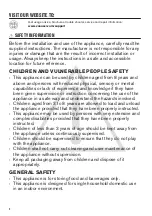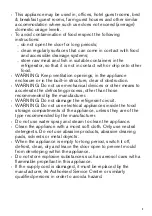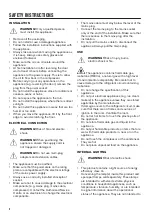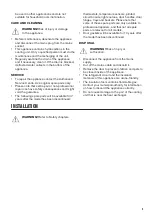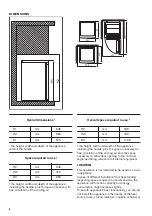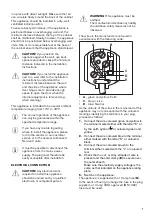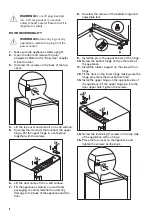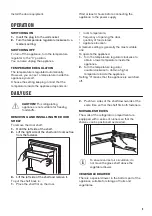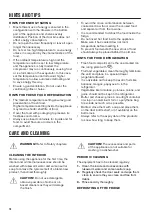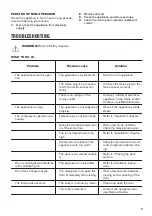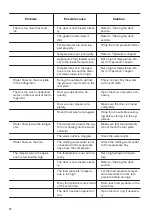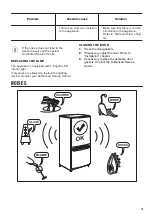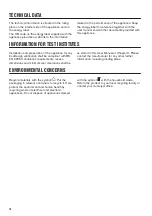
HINTS AND TIPS
HINTS FOR ENERGY SAVING
•
Most efficient use of energy is ensured in the
configuration with the drawers in the bottom
part of the appliance and shelves evenly
distributed. Position of the door bins does not
affect energy consumption.
•
Do not open the door frequently or leave it open
longer than necessary.
•
Do not set too high temperature to save energy
unless it is required by the characteristics of the
food.
•
If the ambient temperature is high and the
temperature control is set to low temperature
and the appliance is fully loaded, the
compressor may run continuously, causing frost
or ice formation on the evaporator. In this case,
set the temperature control toward higher
temperature to allow automatic defrosting and
to save energy this way.
•
Ensure a good ventilation. Do not cover the
ventilation grilles or holes.
HINTS FOR FRESH FOOD REFRIGERATION
•
The medium temperature setting ensures good
preservation of fresh food.
Higher temperature setting inside the appliance
may lead to shorter shelf life of food.
•
Cover the food with packaging to preserve its
freshness and aroma.
•
Always use closed containers for liquids and for
food, to avoid flavours or odours in the
compartment.
•
To avoid the cross-contamination between
cooked and raw food, cover the cooked food
and separate it from the raw one.
•
It is recommended to defrost the food inside the
fridge.
•
Do not insert hot food inside the appliance.
Make sure it has cooled down at room
temperature before inserting it.
•
To prevent food waste the new stock of food
should always be placed behind the old one.
HINTS FOR FOOD REFRIGERATION
•
Fresh food compartment is the one marked (on
the rating plate) with
.
•
Fruit and vegetables: clean thoroughly (eliminate
the soil) and place in a special drawer
(vegetable drawer).
•
It is advisable not to keep the exotic fruits like
bananas, mangos, papayas etc. in the
refrigerator.
•
Vegetables like tomatoes, potatoes, onions, and
garlic should not be kept in the refrigerator.
•
Butter and cheese: place in an airtight container
or wrap in an aluminium foil or a polythene bag
to exclude as much air as possible.
•
Bottles: close them with a cap and place them
on the door bottle shelf, or (if available) on the
bottle rack.
•
Always refer to the expiry date of the products
to know how long to keep them.
CARE AND CLEANING
WARNING!
Refer to Safety chapters.
CLEANING THE INTERIOR
Before using the appliance for the first time, the
interior and all internal accessories should be
washed with lukewarm water and some neutral
soap to remove the typical smell of a brand-new
product, then dried thoroughly.
CAUTION!
Do not use detergents,
abrasive powders, chlorine or oil-
based cleaners as they will damage
the finish.
CAUTION!
The accessories and parts
of the appliance are not suitable for
washing in a dishwasher.
PERIODIC CLEANING
The equipment has to be cleaned regularly:
1.
Clean the inside and accessories with
lukewarm water and some neutral soap.
2.
Regularly check the door seals and wipe them
clean to ensure they are clean and free from
debris.
3.
Rinse and dry thoroughly.
DEFROSTING OF THE FRIDGE
10


